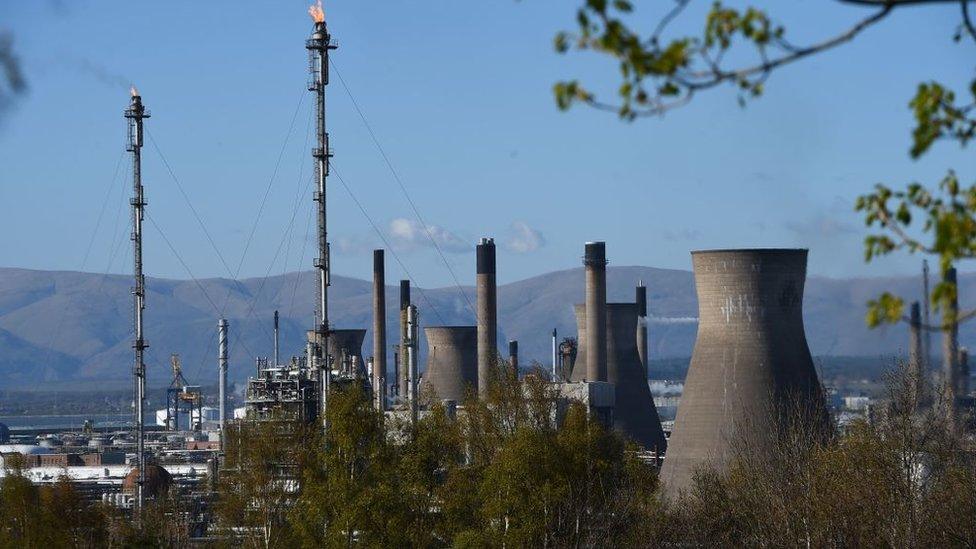Grangemouth closure 'most likely outcome'

Petroineos announced in November that the Grangemouth refinery is to close
- Published
An expert body set up to protect communities from the economic impact of tackling climate change says the closure of Scotland's only oil refinery is now "the most likely outcome".
The Just Transition Commission - appointed by the Scottish government - said that despite the Grangemouth refinery's closure being "clearly foreseeable" inadequate planning had left the town unprotected.
It was announced in November that Petroineos, the owner of the refinery, intended to cease operations at Grangemouth by 2025, putting 400 jobs at risk.
The Scottish and UK governments are exploring how the site can continue to play a role in the switch away from fossil fuels.
But the report criticised a lack of effective planning and called for "an accelerated schedule of intensive work" from the two governments so they "can each still play a positive role in reshaping Grangemouth's economy".
Unions representing workers at the site say talks in recent days involving the Scottish and UK governments have given them fresh cause for optimism.
They want to see the refinery remain open longer to buy time for a new greener alternative to be established at the site.
'Unjust transition'
The Just Transition Commission includes experts and leaders from trade unions, voluntary organisations, environmental groups, business and industry.
Its purpose is to advise the Scottish government on how to cut carbon emissions in a fair way.
The term "just transition" means shifting from one industry to another - in this case a greener one - without the devastating impact on communities which was felt when the coal mining and steel industries ended.
When the announcement of the intention to close Grangemouth was made, the commission said it would be a key test of whether a just transition could be a reality.
However, its report says the lack of effective planning by governments means the current path will deliver a "disorderly and unjust transition".
It concludes that the Scottish government’s strategy for ensuring industrial operators deliver on their commitments is “unclear”.
Phase-out fossil fuels
Grangemouth is one of six refineries in the UK and the only one in Scotland.
It is the oldest refinery in the UK, first established in the 1920s and expanding into petrochemicals in the 1950s, and is in need of an expensive overhaul.
It accounts for about 14% of the UK's overall refining capacity and supplies almost two-thirds (65%) of demand for refined oil products in Scotland.
But Petroineos says it can't compete with the more modern refineries of Asia and the Middle East and so it is exploring the option of closing it down.
The commission's report said the "inevitable phase-out of fossil fuels" requires a new future for the site and its workers.
It says this should "involve workers and communities so that closure and greening is shaped in a socially positive way".
The commission said it expects to see a draft Just Transition plan to be agreed by the end of September.
"The value of the plan will depend on the level of assurance and security it provides to workers whose livelihoods are on the line, as well as to the local community in Grangemouth," it says.
"Grangemouth needs a new economic model that goes well beyond the refinery to leverage enduring community benefit."

Commission co-chair Satwat Rehman says any public money for ‘just transition’ must have conditions attached
Satwat Rehman, the co-chair of the commission, says most of the eight months since the closure announcement have shown little signs of an "orderly and just transition".
But she welcomed a joint commitment made last week between the Scottish and new UK governments to explore available options.
Ms Rehman said: "It shows that people are prioritising this, are seeing the significance of this - not just locally, for the people and communities here - but nationally."
She added that any public money used to support a green transition must come with conditions attached to ensure there are economic benefits to the surrounding community.

Site union convener Chris Hamilton believes there's enough time to stop its closure
The plan for Grangemouth is to replace the existing refinery with a fuel import terminal which would cut the number of jobs from about 450 to 100.
It would take around three years to decommission the site, during which time about 300 jobs would be retained.
One option being considered is to replace it with a facility creating plant-based biofuels - such as sustainable aviation fuel (SAF) - but there are barriers around where the plants to feed the facility would be grown.
In the King's speech this week, it was confirmed that the new UK government intends to produce a bill which would create a funding mechanism to support SAF production.
Chris Hamilton, a plant operator at Petroineos - who is also convener for the Unite union - believes an extension to the refinery would buy time for a new greener alternative to be established at the site.
He accepts the refinery at some point needs to move into "the energies of the future" but not on such a short timescale.
Mr Hamilton said: "For there to be a future that minimises job losses, we need a just transition here at Grangemouth and the only way in which that will be achieved is through an extension to the refinery."
'No stone unturned'
Iain Hardie, regional head of legal and external affairs at Petroineos, said there was a great opportunity for Grangemouth and its skilled workforce to be at the vanguard of low-carbon fuels manufacturing.
However, he had there were a number of hurdles to overcome.
Mr Hardie said meaningful engagement between industry and government was vital.
"Delivering change will require all stakeholders to work collaboratively to develop complex commercial ecosystems which do not yet exist or are not currently economically viable without legislative or regulatory support,” he said.
A Scottish government spokeswoman said it was vital to secure a long term, sustainable future for Grangemouth.
She said the site and its workforce were crucial to Scotland’s economy and its transition to net zero.
"We will leave no stone unturned in our pursuit of this mission and welcome the collaboration of our partners in the community, industry and in particular the UK government," she said.
The spokeswoman said Scotland's acting Energy Secretary Gillian Martin and UK Secretary of State Ed Miliband will co-chair the Grangemouth Future Industry Board Leadership Forum.
There will also be a draft Grangemouth Just Transition Plan published soon, she said.
Related topics
- Published12 July 2024

- Published12 July 2024

- Published22 November 2023
